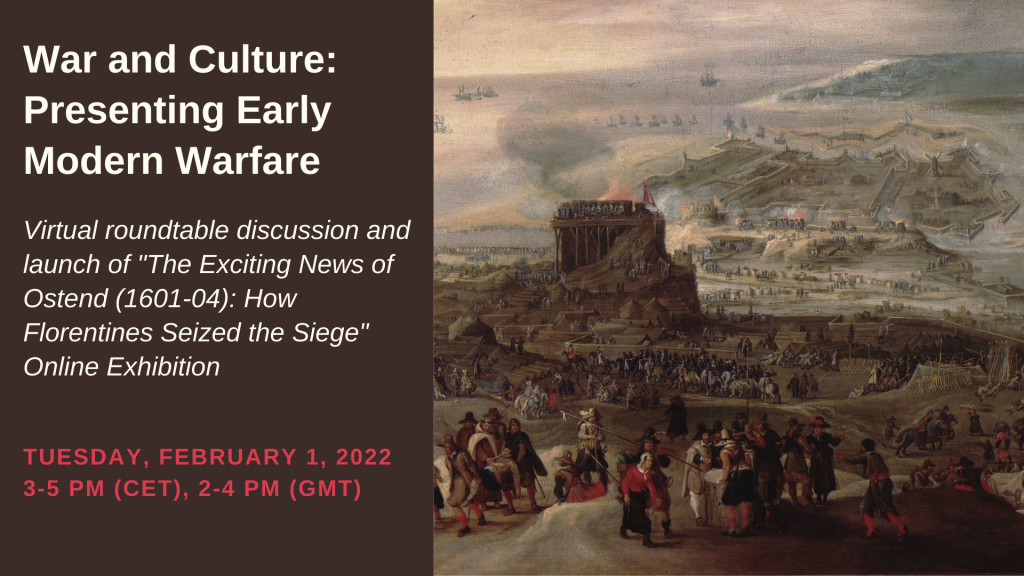War and Culture:
Presenting Early Modern Warfare

The Euronews Project (funded by the Irish Research Council in collaboration with the Medici Archive Project in Florence) organised a virtual roundtable discussion, in the afternoon of Feb. 1, 2022, on the theme of "War and Culture: Presenting Early Modern Warfare", in the context of the launch of our new online exhibition entitled “The Exciting News of Ostend (1601-04): How Florentines Seized the Siege.”
Topics addressed include but are not limited to: sieges in general, war narratives, autobiography, war and memory, war in literature, specific battles, and fiscal systems for warfare.
Programme:
- Opening by Prof Brendan Dooley (Euronews Project, University College Cork)
- Presentation of the online exhibition by Dr Maurizio Arfaioli (Medici Archive Project) and Sara Mansutti (Euronews Project, University College Cork)
- Roundtable moderated by Wouter Kreuze (Euronews Project, University College Cork):
- Dr Anke Fischer-Kattner (Universität der Bundeswehr München)
- Dr Nina Lamal (Royal Netherlands Academy of Arts and Sciences - NL-Lab and Huygens ING)
- Dr Raymond Fagel (Leiden University)
- Dr Regine Maritz (University of Bern)
- Prof Judith Pollmann (Leiden University)
- Dr Amy Lidster (Jesus College, Oxford)
- Prof Penny Roberts (University of Warwick)
- Dr Michael Depreter (Harris Manchester College, University of Oxford)
- General Discussion
Below, the recording of the virtual roundtable:
Speaker Biographies
Dr Michael Depreter
Research Associate, European Fiscal Military Systems, Harris Manchester College, University of Oxford
As a historian of politics and warfare, Dr Michael Depreter is particularly interested in the development of late medieval and early modern polities which contributed to the shaping of our modern world. His PhD thesis, obtained from the University of Brussels (Université libre de Bruxelles), examined the dynastic state’s increasing monopoly of the legitimate use of violence in light of the emerging, and indeed quite costly, gunpowder artillery (15th- early 16th century). Through the case of the Valois-Habsburg use of gunpowder artillery as a tool for state-building in the Low Countries, he argued that the specific political culture of this densely urbanized area with strong traditions of political participation impeded the Valois dukes of Burgundy and their Habsburg successors from using the new weaponry’s full potential in terms of resource-extraction (money, manpower, strategic resources) to fulfill their ambitions of autocratic sovereignty. On moving to Oxford as a postdoctoral researcher with a Wiener-Anspach Fellowship, he obtained a British Academy Postdoctoral Fellowship which allowed him to investigate the diplomatic side of state-building and resource-pooling in the densely urbanized Low Countries from a comparative perspective. His goal was to understand how the progressive loss of urban autonomy, under increasingly strong pressure from the dynastic state, forced merchant communities and other groups with interests abroad to develop precocious lobbying techniques in order to defend their commercial and financial interests as the dynastic state developed a monopoly of diplomacy, a process which was not only top-down but desired by some mercantile groups.
Dr Raymond Fagel
Lecturer in Early Modern History, Leiden University
Raymond Fagel is Lecturer in Early Modern History at the Institute for History of Leiden University. His research is mainly focused on the relations between Spain and the Low Countries during the sixteenth century. He recently published Protagonists of War. Spanish Army Commanders and the Revolt in the Low Countries (Leuven 2021) and he is co-editor of Early Modern War Narratives and the Revolt in the Low Countries (Manchester 2020).
Dr. Anke Fischer-Kattner
Postdoctoral Lecturer, Historisches Institut, Universität der Bundeswehr München
Anke Fischer-Kattner is an early modern historian at the Universität der Bundeswehr, Munich. She is interested in different types of intercultural encounter and conflicts. Having investigated othering and identification in her doctoral dissertation on European travelers in Africa (Spuren der Begegnung. Europäische Reiseberichte über Afrika 1760–1860 (Göttingen: Vandenhoeck & Ruprecht, 2015)), she has extended her field of research to the violent clashes of early modern siege warfare (see The World of the Siege. Representations of Early Modern Positional Warfare (Leiden: Brill, 2019), jointly edited with Jamel Ostwald). Her current project takes a long-term look at the sieges of the Rhine fortress of Philippsburg from the Thirty Years’ War to the Napoleonic Wars.
Dr Nina Lamal
Postdoctoral Researcher at NL-Lab and Huygens ING
Nina Lamal obtained her PhD from KU Leuven and the University of St Andrews in 2014, with a thesis on Italian news reports, political debates and historical accounts of the Revolt in the Low Countries (1566-1648). Currently her research focuses on the role of media in politics and international relations in Early Modern Europe. She is a postdoctoral researcher on the project ‘Inventing Public Diplomacy in Early Modern Europe’ and an editor of the Correspondence of Christofforo Suriano (1616-1623) at the Humanities Cluster of Royal Netherlands Academy of Arts of Sciences.
Dr Amy Lidster
Departmental Lecturer in English Language and Literature, Jesus College, Oxford
Dr Amy Lidster is a Departmental Lecturer in English Language and Literature at Jesus College, University of Oxford. Her first book – Publishing the History Play in the Time of Shakespeare: Stationers Shaping a Genre – will be published by Cambridge University Press in March 2022. She is currently working on a project called Wartime Shakespeare, which examines the role and impact of Shakespeare in performance during periods of conflict from the eighteenth to the twenty-first century. It involves a monograph, edited collection, and public exhibition (‘Shakespeare at War’), which will be held at the National Army Museum, London in 2023/24.
Dr Regine Maritz
Postdoctoral Researcher, University of Bern
Dr Regine Maritz is a cultural historian of the early modern period with a particular interest in the political dimensions of gender and other socially constructed categories of difference, as well as the history of the body. She completed her doctoral work in November 2017 under the supervision of Prof. Ulinka Rublack. Her thesis focused on how gender difference can be read as a resource of courtly politics and state-building processes in the duchy of Württemberg from 1580 to 1630. This work was written in collaboration between the University of Cambridge and the German Historical Institute Paris. Previously, Regine Maritz was the Robert Owen Bishop Scholar of Christ’s College Cambridge, and she completed her M.Phil. in early modern history in 2012 at Corpus Christi College Cambridge. She obtained her BA in Modern History and International Studies from the Queen’s University of Belfast. Her most current research interests include questions of subjectivity and identity in early modern self-narratives, the experience and construction of violence and power, as well as processes of state-formation and specifically the connections between these various topics.
Prof Penny Roberts
Professor in of Early Modern European History, University of Warwick
Prof Penny Roberts is Professor of Early Modern European History and Chair of the Faculty of Arts at the University of Warwick. From February to June 2019 she was Fellow of the Institut d’études avancées de Paris. She has published widely on the social, religious, cultural and political history of sixteenth-century France, including her most recent book Peace and Authority during the French religious wars c.1560-1600.
Prof Judith Pollmann
Professor in Early Modern Dutch History, Leiden University
Prof Judith Pollmann studied history at the University of Amsterdam and Renaissance Studies at the Warburg Institute in London. In 1998 she was awarded her doctorate at the University of Amsterdam for a study of the religious development of the diarist and humanist Arnoldus Buchelius (1565-1641). From 1995-2005 she taught early modern European history at Somerville College and the University of Oxford. She came to Leiden in 2005, and currently holds a personal chair in Early Modern Dutch History. From 2008-2013 Judith Pollmann was director of the NWO VICI research project Tales of the Revolt. Memory, oblivion and identity in the Low Countries, 1566-1700. With Henk te Velde, she is currently directing the NWO Vrije Competitie project, The persistence of civic identities in the Netherlands, 1747-1848. She is a member of the editorial board of Past and Present.
